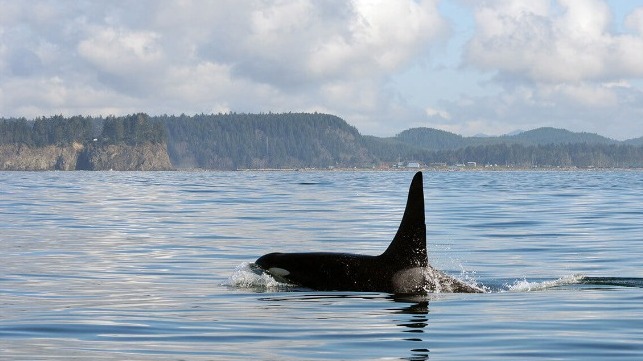To Save Orcas, Washington Program Seeks a Slowdown in Admiralty Inlet
A trial of a seasonal, voluntary slowdown area for large ships starts October 24

This fall, vessel operators transiting to and from Seattle and Tacoma will be asked to participate in an experiment to reduce the impact of shipping on Southern Resident Killer Whales, an endangered population of orcas in the Salish Sea. The whales are sensitive to underwater noise from shipping, which interferes with their ability to find and fish for salmon, their sole source of sustenance. Slower vessels are quieter vessels, and operating under about 10-14 knots is dramatically less noisy because of reduced cavitation.
A new program created by Washington Maritime Blue - the state's maritime industry tech accelerator - is working on several inventive ways to help shipping slow down. Its Quiet Sound initiative started off last year with the expansion of B.C.'s Whale Report Alert System (WRAS), which keeps pilots and mariners digitally updated on recent whale sightings via an app.
Quiet Sound's next program is a trial of a slowdown area in Admiralty Inlet, the entrance to Puget Sound. Slowdown areas are designated zones where large ships are asked to reduce their speed, voluntarily, in order to cut back on underwater noise. The Port of Vancouver has implemented a seasonal slowdown program and has managed to cut underwater noise in Haro Strait and Boundary Pass by about 50 percent. The Haro Strait slowdown runs from about June through November, depending on orca presence, and the port says that it only delays vessels by about 15-45 minutes. Merchant vessel operators have generally appreciated the effort, and the Port of Vancouver's participation rate goal is in the range of 90 percent.

that matters most
Get the latest maritime news delivered to your inbox daily.
In the fall and winter, the orcas move down to the Puget Sound, and Quiet Sound wants to replicate the voluntary slowdown area on the Washington side of the boundary to cover their seasonal migration. This year, a voluntary trial area will cover the waters west and south of Whidbey Island, from Admiralty Head to Apple Cove. Fast-moving car carriers, boxships and cruise ships will be encouraged to slow to 14.5 knots or less, so long as it is safe; slower bulkers and tankers will be asked to slow to 11 knots.
The trial in Puget Sound will run from October 24 through December 22, and fleets with high rates of participation can receive documentation that credits towards their Green Marine certification (if they participate in the popular port incentive program).
